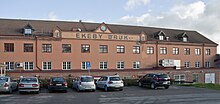Upsala-Ekeby

Former Ekeby factory in 2011
|
|
| Industry | Ceramics |
|---|---|
| Founded | 1886 |
| Defunct | 1980 |
| Headquarters | Uppsala, Sweden |
| Products | Tableware, tile, brick, and glass |
Upsala-Ekeby AB was a porcelain, tile, brick, and glass company founded in 1886 in Uppsala, Sweden. From 1910 to 1945, Upsala-Ekeby produced tile stoves in Ekeby. In 1910, Upsala-Ekeby hired designers for their production of household and art ceramics. Upsala-Ekeby expanded by buying competing companies including Gefle Porcelain AB Group and the AB Karlskrona Porcelain Factory. In 1964, Upsala-Ekeby began a major expansion with the acquisition of the Swedish ceramic company Rörstrand. To expand their tabletop business, Upsala-Ekeby acquired Reijmyre Glassworks, Kosta Boda (glass) and GAB Gense (cutlery).
The Upsala-Ekeby group of companies was acquired by investment company Proventus in 1980. Proventus sold off all of the companies formerly in the Upsala-Ekeby group between 1982-1984.
Upsala-Ekeby Ltd. was established on 29 January 1886. Uppsala began with production of bricks and tiles. The raw material for production was within the property, and the clay had been found very suitable for ceramic manufacturing. Among the founders of the company were the famous Uppsala families of von Bahr, Ekstrand and Holm, who for decades was to characterize the company's development into a successful industrial company. Brick Production began the same year the company was founded with ceramic tile the following year. After 1910, the company began a fierce competition to make itself a major competitor on the stove tile market . One of its competitors was the Upsala Tile Factory AB. Upsala-Ekeby bought the competing factory in 1916.
In the 1910s, the company began hiring artists. Among the first was Anna-Lisa Thomson and Sven Erik Skawonius. Stove production declined due to modernization of heat supply by central heating . The last tile stove was manufactured in 1945. Instead, the tiles become Upsala-Ekebys major new product. Brick production was discontinued in the 1930s.
The manufacture of household and art ceramics over time became successful and Upsala-Ekeby had several skilled designers and potters. All goods produced at Upsala-Ekeby were earthenware clay found near the factory. Upsala-Ekeby marked their wares with "UE", or with only the word "Ekeby". A competitor in Uppsala with similar production as Upsala-Ekeby (brickyards, tile and ceramic factory) was St. Erik Lervarufabriker . In 1937 Upsala-Ekeby bought St. Erik's ceramics factory. Some ornaments from the factory's production continued to be manufacturing, but with the UE-stamp.
In 1936, Upsala-Ekeby acquired Gefle Porcelain AB Group and in 1942 the AB Karlskrona Porcelain Factory. When plastic during the postwar period began to form competing materials in some areas for the ceramic industry Upsala-Ekeby in 1947 acquired chemical company AB Synthesis . Synthesis later concentrated on raw material manufacturers for the marine industry.
...
Wikipedia
